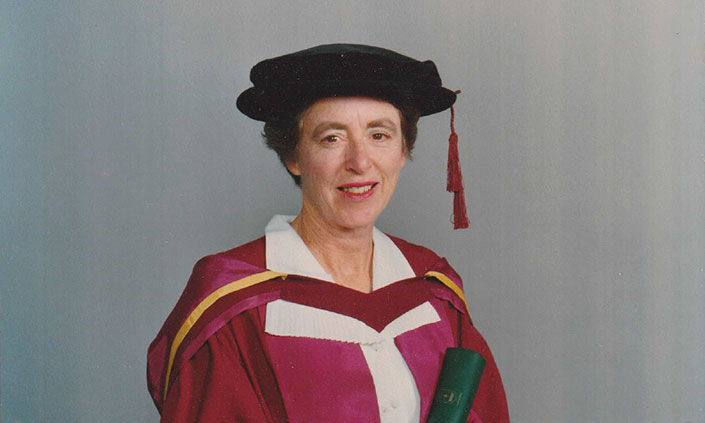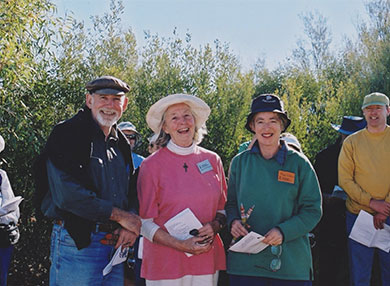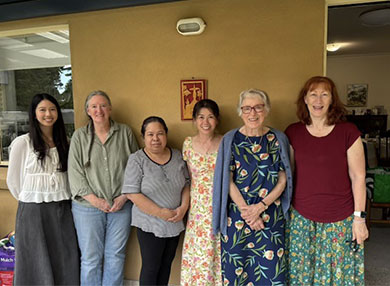A better world through education
Dr Peggy Goldsmith attended Macquarie’s first lectures in 1967, beginning a lifelong journey as student, lecturer, PhD, and generous donor.

Dr Peggy Goldsmith always wanted to attend university and dreamed of studying speech therapy, as it was known then. It’s not surprising, given her early interest in languages and love of learning, but, in 1954 when she matriculated, the course was offered only in Melbourne, so she undertook secretarial study locally while waiting for the course to start in Sydney.
“I learned bookkeeping, typing, shorthand and even deportment, which was all preparation for typing up clients’ details. I’ve always been grateful for my typing skills,” says Dr Goldsmith. Those skills also came in handy when she later worked on the first Macquarie Dictionary as a research editor in pronunciation.
“I did all the words between M and P, typing up the entries on cards and working with a very dedicated team including Pam Peters, Colin Yallop and David Blair out of a cottage on campus. There was great camaraderie and I felt privileged to work alongside Professor Arthur Delbridge, who was a very caring head of school,” she says.
But those days were still ahead of her when, having finished secretarial school, Dr Goldsmith started working – and put her university dreams on hold. “Typing skills were in demand and I wanted to contribute to the family, so I worked as a stenographer and secretary until and after my marriage at 21 to Peter Goldsmith in 1958.”
The newlyweds lived in Cheltenham – about 15 minutes from Macquarie University, founded in 1964. Keen to be part of the new student cohort, in 1966 she was interviewed by Professor Delbridge, the foundation Professor of English (language and linguistics), who hoped a speech therapy course would become available.
Dr Goldsmith enrolled and started the following year, in 1967. “It was the first year of the Wyndham Scheme, when high-school students did an extra year, so most of us were mature-age students,” she says. “I was 30, with three children aged 4, 6 and 8.
“The opportunity to go to university was just so exciting. I enrolled in linguistics, English literature, physics and biology in preparation for speech therapy. It was wonderful to be able to do various courses in different schools. A number of our lecturers had come from other universities, but some had come from business and the wider world, including our physics lecturer Professor Peter Mason.
“His method of using concrete learning to demonstrate wave motion by bouncing ropes above us in the lecture theatre, for example, made learning so much easier,” Dr Goldsmith recalls. “All our assignments were very practical and the material for our lectures and tutorials were just being written – there were no books or guides to follow. It was all very new and we worked hard to make the most of this great opportunity.”
Of course, Dr Goldsmith remembers lectures being accompanied by the sound of drilling and pouring concrete as new buildings went up around the students. “Only E7 and W6, the library and the union were built when we started. We’d eat our lunch in the quadrangle outside the library.”
Starting part-time, Dr Goldsmith gradually increased her load to full-time and changed her focus to education. “The speech therapy course had gone to paramedical sciences by then and was only offered during the day in the city, so that was out of the question. But once I’d started university, I wasn’t going to stop.”
Dr Goldsmith graduated in 1974 with a Bachelor of Arts, majoring in psychology with honours in linguistics, specifically acoustic phonetics, and a Diploma of Education – and her career as an English as a Second Language (ESL) teacher began. “It was unusual in the early 1970s for primary teachers to have a degree; Macquarie gave me a head start,” she says. A degree meant her salary was higher than other beginning teachers and more job opportunities were available.
“But it also educated me to think – I thank my psychology lecturer, John Martin, for this,” Dr Goldsmith says. “I remember staying up all night once trying to work out a theory for the world! We studied so many things in great depth, which encouraged me to continue learning throughout my life. I was also able to follow my interests across different schools; there was a great deal of cooperation. It was all very innovative.”
Her first teaching appointment was at Merrylands East Primary School, where groups of children would see her for intensive English lessons. “I was very happy to be teaching and received new arrivals every fortnight from the Commonwealth flats nearby,” she says.
“In those days, the children were coming from Greece, South America, Croatia via Germany and from Lebanon. Through my linguistic studies, I was able to work out the sounds in the background languages that the children were finding difficult in English. It was the very early days of ESL and there was little in the way of existing materials for primary children learning English, so we prepared our own.
“I was able to communicate with some of them in German, thanks to my family background and language studies at [the then] Fort Street Girls High School, and could also speak French with the children from Guinea,” she explains. “Teaching from Kindergarten to Year 6 could be challenging, but I’d gained a certain flexibility at Macquarie, which meant we were well-prepared and confident.”
Dr Goldsmith also had a heart for migrant and refugee experiences, gained through her own close, postwar childhood friendships, which in turn saw her supporting the health and wellbeing of both the children she taught and their parents.
As a result of her expertise, Dr Goldsmith was quickly invited to the NSW Department of Education as a consultant. “In 1977, it was even rarer for a primary teacher to have a degree in linguistics, so I joined the team that trained mainstream teachers to become ESL teachers,” she says.
Then came the opportunity to lecture in the Teacher Education Program at Macquarie, thanks in part to her hands-on experiences in schools. “They wanted something practical and someone with a knowledge of linguistics,” says Dr Goldsmith, who had also tutored at the university.
With her linguistics expertise in demand, teaching positions in western Sydney followed, with the ‘proverbial Jiminy crickets’ – kids that were hard to keep on task, streetwise at an early age, but lovable. “They had difficulty learning but I taught them to read by drawing comic-strip-style characters, badly, on the board,” she says.
“They went home every night with a copy of the day’s comic from a jelly pad [a forerunner of the photocopier], smelling strongly of methylated spirits! This was not the usual way of teaching children to read, but my lecturer Judy Goyen had taught us to be eclectic in the teaching of reading and I needed to be flexible.”
Through the 1980s and 90s Dr Goldsmith’s career included surveying ethnic-specific provisions for schools that housed migrant and Indigenous children with physical and intellectual disabilities to providing resources, training and support to schools with newly-arrived students from non-English-speaking backgrounds. Her career culminated in leadership roles, where she continued advocating for inclusive education and teacher development.
Her PhD from Macquarie was awarded in 1991. “My thesis was on the development of spelling and word knowledge in older students. Over several years, I conducted empirical research on language development among students and developed a language testing program,” Dr Goldsmith says.
“I had a wonderful career – varied, satisfying and interesting – because of the opportunities that I would not have had, had it not been for gaining a degree at Macquarie University. I’ve always been very grateful for my university education – your worldview expands and you’re better equipped to accept positions of leadership and change.”
Despite retiring in 1999, Dr Goldsmith has continued her advocacy work. “That’s where my heart lies,” she says, explaining she is driven by a desire to make the world a better place – something that was modelled by her parents and has echoed through her life and career.

Her involvement spans letter writing to politicians on behalf of refugees, assisting in projects run by local Aboriginal groups, contributing to environmental submissions and being part of the leadership of social-justice group Wellspring Community.
Close to her heart remains educational opportunity, which she also sees as social justice. “My teaching was all in Sydney’s west and I know the importance of these students being able to gain degrees and have interesting and successful career opportunities – many of them are the first in their families to go to university,” Dr Goldsmith says.
“That’s why I support Macquarie University through scholarships and encourage others who have enjoyed their days at Macquarie to donate. I feel that by giving to a student, whoever it is, I’m able to give them an opportunity such as the one I was so fortunate to have.”
Dr Peggy Goldsmith's bio
Dr Peggy Goldsmith holds a BA (Hons) Dip. Ed. and a PhD in Education from Macquarie University, focussing on children’s language development.
She has been a primary school ESL teacher, ESL lecturer, NSW Department of Education consultant and lecturer at Macquarie University and Western Sydney University. She also worked as a research editor on pronunciation for the first Macquarie Dictionary.

Dr Goldsmith has had a long-term interest in supporting refugees. As part of the Commonwealth Community Sponsorship Program, with others she sponsored Lao families (also a number of unaccompanied minors) to resettle in Ryde, Sydney, in the 1980s.
With others she founded the Blue Mountains Refugee Support Group in 2001, which supports refugees in western Sydney with accommodation, ongoing support, community visits and advocacy, assistance with employment, fundraising and education, and making available phones, tablets and computers where needed. She belongs to a letter-writing group advocating for refugees.
Dr Goldsmith has lived in the Blue Mountains for 40 years and has a passion for family, contemporary Australian Christian worship, social justice, the Wellspring Community, choral singing, reading and bushwalking. She has 10 great-grandchildren as well as stepchildren and grandchildren from a later marriage. Her daughter, Helen, is a Macquarie University graduate.
Level 2, 18 Wally's Walk
Macquarie University NSW 2109